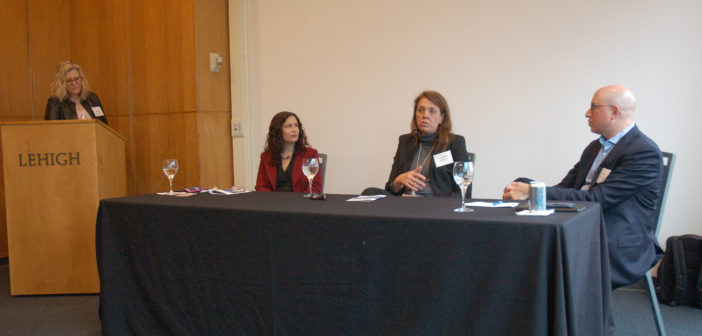When Kendall O’Brien received a promotion, she realized she was trying to be the person who preceded her position, rather than her own person.
Later, O’Brien, who is now the vice president of finance, CFO of medical devices and diagnostics, and global CFO of healthcare at Johnson & Johnson, was moved to the global sector of the company. She was excited to engage in a new position but faced an unexpected set of circumstances at the same time — she received news that she was soon to become an adoptive parent, and was pregnant as well.
O’Brien was this year’s keynote speaker at the Lehigh Women in Business fourth annual conference on April 25. She told the audience to be open and honest when personal things arise in the workplace. From these experiences, she learned the importance of authenticity, as well as how much she valued flexibility in her work life.
“If you can’t bring yourself to work, you’re not going to succeed in life,” she said. “It’s awful hard work to be somebody else. It’s a lot easier to be you.”
O’Brien said she felt the most fulfilled and successful at work when she was herself, with “all faults and all strengths.”
The conference — which took place at Iacocca Hall on Mountaintop Campus and included two panels, a dinner, a keynote speaker and a networking reception —was mostly organized and run by the Women in Business president, Kristen Silvi, ’19, and its executive board.
It was open to students of all genders and majors as well as alumni.
Throughout the year, Women in Business hosts networking events, recruiting events and etiquette dinners. The spring conference is its largest event.
Silvi said the conference gives students the chance to learn from successful alumni about developing leadership skills, having a voice and initiating difficult conversations in the workplace.
“I feel like we’re in a bubble and on campus, we don’t recognize these hardships that we’ll eventually have to go through,” Silvi said.
She said speaking to alumni prepares female students for what to expect in the business world and provides them with the opportunity to learn what to do when situations arise.
Kathleen Weiss Hanley, a finance professor and moderator of the conference, said the event teaches women how to be assertive in the workplace. She said this includes speaking their mind, voicing controversial opinions, bringing up sensitive topics, having uncomfortable conversations and “not being worried or nervous about looking foolish.”
These topics were addressed during the panels. One of the panels, titled “Finding and Owning Your Voice,” was moderated by Hanley and featured panelists Michelle Tillis Lederman, ’93, Jenniffer Collins, ’91, and Steven Berns, ’86.
The panelists discussed how to address a boss and ask for a promotion; moving on from a company for new opportunities; and the importance of being self-aware, asking questions and showing hard work.
“Men ask for a promotion when they feel they’ve done 60 percent of the work, whereas women need to do 110 percent before they ask for a promotion,” Silvi said.
Lederman said women will wait to take a risk and put themselves out there, and what holds women back is the feeling that they are not good enough.
“It is feminine to be powerful,” Lederman said. “It is feminine to speak up.”
The second panel, titled “Inclusion and Collaboration in the Workplace,” was moderated by Donald Outing, Lehigh’s vice president for equity and community. The panelists included Dina DiLorenzo, ’93, Mark Roberts, ’85, and Sharon Voelzke, ’88.
DiLorenzo said diversity in the workplace not only includes race, age and ethnicity, but also life experiences, talents and where someone is in their career.
“Without inclusion, we can’t do anything with diversity,” DiLorenzo said.
Silvi said the two panel topics created the conference’s main theme: “becoming the authentic leader you envision.”
“This is about finding and becoming your true self, and staying true to your values and morals while pleasing the company and other employees you’re working with,” Silvi said.
Katie Eyring, ’20, a member of Lehigh’s Women in Business, said hearing from people in “high-up positions” is important because they have seen or faced every problem in the workplace — from discrimination to feeling as though their voices were not being heard.
“Oftentimes we hear that if you don’t fight for those promotions that you want you could just end up sitting behind the scenes and no one will ever give you recognition for the hard work you do,” she said.
Eyring believes attitude is more important than skill set.
“Communication skills are so much more important than showing that you’re the smartest person in the room,” she said.
Empowering women in the business world is not just happening at Lehigh, but all throughout the Lehigh Valley.
The Lehigh Valley Women’s Business Council offers training and programs structured around what it believes women need to know today to be better businesswomen. It brings speakers to the Lehigh Valley, hosts awards events to recognize women in the area, provides women-to-women mentorship and has scholarship programs for adults furthering their education and high school senior girls going to college.
President Gladys Wiles said the council’s mission statement is to empower, inspire and recognize local women in business.
The council’s biggest event is the women’s summit held every June. This year’s theme is “speak up” and will feature Tarana Burke, the founder of the #MeToo movement, as one of the keynote speakers. The event will be held on June 6 at Cedar Crest College.






Comment policy
Comments posted to The Brown and White website are reviewed by a moderator before being approved. Incendiary speech or harassing language, including comments targeted at individuals, may be deemed unacceptable and not published. Spam and other soliciting will also be declined.
The Brown and White also reserves the right to not publish entirely anonymous comments.
2 Comments
Ugh. While I recognize that the women on the panel didn’t get where they are by looking at the game and calling bullshit, let’s be a little real.
1. Women are not afraid to negotiate. Women get told that they’re afraid to negotiate and that this is why they don’t get promotions and raises. This is a lie. Women negotiate all the freaking time: workloads, project roles, home responsibilities, employee compensation and powers, division direction, children’s opportunities, etc. It’s true they don’t generally doing it by filling the air with atomised baloney about how wonderful they are. If your message is that this is the right way to negotiate, you have a garbage message and should think hard about the kind of work culture you’re promoting.
2. This lie about women’s failure to negotiate is a distraction, and it’s meant to be a distraction. Men do not belly up in the manner now taught to women and announce to bosses that by god, they deserve fat raises, then get them. Men have pleasant conspiratorial conversations with their buddies in higher positions, and the buddies, who usually initiate the conversations in the first place, give them a hand up. The buddies do this in order to (a) do a solid; (b) stack up favors owed; (c) build a posse. Qualifications are part of the point, but loyalty and prior relationships count for more. Here’s how you’ll build those relationships if you’re a woman: you’re probably not eligible, because the guys you’re aiming to talk to don’t quite see you as a person, let alone a loyal buddy. You won’t be invited to these conversations.
If women actually did become ace at doing this nonsense now billed as “how to negotiate, for women”, the goalposts would promptly shift.
3. A good boss will not jerk you around and make you go through some kind of hunger-games negotiation before paying you reasonably. A good boss actually pays attention to what people on the team are doing and works to make sure that not only are people compensated fairly, but that they’ve got opportunities for growth and advancement. If you’re working for people who play games like this, and you can find another boss, do it.
As for Katie’s point about recognition — oh, don’t worry, your hard work will be recognized. Everyone will be very grateful for it. It just won’t be compensated if you’re working for people who are cool with stealing your labor. Try not to work for people who are cool with stealing people’s labor. Don’t be such a person yourself.
4. If you’re going to lean in, as suggested above, you’d better make sure you’ve got a net. Unless you’re leaning into a friendly environment, you’re not assertive; you’re the crazy demanding bitch. Again, this is part of the distraction that involves telling you you’re doing it wrong. You’re not doing it wrong.
5. The most effective way of ensuring that women are promoted and paid equitably is to have and enforce equal pay laws and anti-secrecy laws about revealing compensation, as well as laws that require boards to have representative demographics, companies and government units to reveal all compensation, and anti-retaliation laws that protect the jobs and job status of women who report sexual harassment and assault. Make it crystal-clear that failing to abide by such laws is a fast road to career death. These things work all over the world. It’s ridiculous that it takes this much effort to shove the good-ol-boy machine into daylight and shut it down, but this is what it takes.
How do you get and enforce those laws? Elect more diverse legislatures. Appoint more diverse lawyers as judges. It’s just extraordinary how fast the rules change when that happens.
Here’s what not to do along the way: keep telling women/POC that they’re just not doing bidness right, that they’re too frightened and squeamish about…assertiveness? loss of femininity? for real?…and that this is the problem.
Next time: skip this panel and instead do a panel for future managers called “Why You Will Find it Very Difficult to Avoid Dicking Over Your Employees with Race and Gender Bias, and Why You Should Avoid It Anyway”. You know? Let’s maybe put the responsibility for this where it belongs.
I like your last paragraph and punchline last sentence. As I tell my youngest daughter, when others make you feel inadequate, it is likely telling you more about them than you. Know yourself.
My last boss was focused on results not gender, race, age, physical appearance nor politics and also compassionate with those who did not measure up. Uncommon but not unique.
Most people are perceptive as to their managers (teachers in education) qualities. You probably already know if the “real you” will be accepted and rewarded. If you can enjoy the work and don’t want to move on don’t frustrate yourself by trying to influence the inflexible.